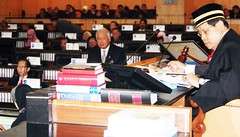By Ivy Kwek
The recently concluded House of Representatives sitting has seen to be a season of cutting salaries. A total of ten motions to cut the salaries of the Attorney-General, the Chief of Malaysia Anti-Corruption Commission, the eights Ministers i.e. of Energy, green technology and water, defense, tourism, works, transport, information and communication technology, health and women, family and community development, respectively, were brought forward, which is a significant number.
The attack mode in Parliament was somehow interspersed with some humour, when the deputy Speaker of the House, Ronald Kiandee, made a careless mistake twice in the house. In the motion moved by Lim Kit Siang to cut the salary of the Attorney-General by RM10, the deputy Speaker caught the House by surprise, judging wrongly on which vote got a ‘louder’ voice, almost causing the motion to be passed and granting the opposition an accidental score. Interestingly, he repeated the same mistake several days later when the pay-cut motion was moved again, this time, against the minister of Energy, Green Technology and Water Peter Chin Fah Kui, almost jeopardising his credibility.
For those who are not familiar with parliamentary procedure, this process, which is called voice voting, is a customary procedure in the passing of bills and motions. In usual cases, BN MPs will collectively say ‘ayes’ to the passing of the bill, while the opposition usually say ‘noes’ to it. Although the standing order 46 (2) states that the Speaker shall collect the voices and declare the result, it is almost an open secret that the Speaker will always judge in favour of the government.
In these two cases, however, the pay-cut motions were being moved by the opposition, thus it would be the other way round with the government saying no and opposition saying yes. The deputy Speaker, at the first instance judged that there are more voices saying ‘ayes’, which implied that the motion would be passed. Although he later retracted his remarks, the ambiguity has led to the protest of the opposition.
The opposition made good use of Standing Order 46 (4) which states that a Division can be called if more than 15 members ask for it. Division by its definition is recorded votes by name-calling. Though both the motions were eventually rejected with the government majority, the confusion of the Speaker, possibly by his mundane obligation, undoubtedly raised questions on whether the Speaker was acting impartially.
A pass to the motion, although not of serious financial harm to civil servants nor to the government, would nonetheless have been seen as a vote of no confidence for the government and would also have earned some political mileage for the opposition. Though the day was eventually saved for BN, these incidents shed some light on the institutional structure that is worth pondering.
Choosing a Speaker is one of the first things a newly elected House does. Selecting a Speaker by voting also means that Speaker is usually from the government’s camp. It is usually preceded with internal negotiation within the party, or in the case of Malaysia, between the component parties in the coalition, to decide who the agreed candidate is.
The partisanship of a Speaker, thus often leads to the contestation of the issue of his independence in judgment. How does the House ensure the independence of their Speaker? By convention, a Speaker will resign from their party position once they are elected, as in the case of the current Dewan Rakyat Speaker Tan Sri Pandikar Amin Mulia. However, this is not an obligation. In order to ensure that the Speaker can function without financial ties, United Kingdom law has it that the salary of the Speaker should come from the consolidated fund, not subjected to the approval of Parliament (House of Commons Act (Speakers) 1832). In Zambia, it is an obligation to choose from outside of the Parliament.
It is perhaps worthwhile to note that unlike the presiding officer of other countries’ legislative body, the Speaker of the Malaysian Parliament does not enjoy as much power, as our Parliament does not draft its own budget nor does it have control over its personnel. The budget of Parliament comes under the Federal Budget, while personnel are subjected to the supervision of the Public Services Department.
All things said, the author’s personal opinion is that ultimately, a Speaker earns his credibility by judging with reason and impartiality, not by acting in an authoritarian fashion. The discerning power of the Speaker should be practiced decently, with reasons given that convincing to all parties and the public. The recent decision of the Speaker in rejecting an emergency motion to admonish the teacher who made racial slurs (on the grounds that the motion has no urgency), and the emergency motion on the shooting of three teenagers by police (on the grounds that the motion was not specific, urgent and of public interest) are incidents that have raised doubts amongst the opposition members of Parliament concerning the Speaker’s professionalism.
Perhaps, someone should consider moving a motion to cut the Speaker’s salary instead. -The Rocket




